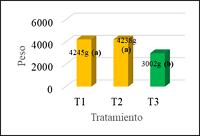Exposure of two types of light color and light intensity on broiler production performance
DOI:
https://doi.org/10.51252/revza.v4i1.572Keywords:
photoperiod, artificial illumination, production parameters, Cobb 500 broilersAbstract
The objective of this research was to establish the influence of artificial light color on the productive parameters of broilers at the CAIM Fundo Miraflores, where 300 broilers in their respective houses were randomly distributed under a completely randomized design in the following treatments: T1 (white colored light), T2 (blue colored light) and T3 (green colored light), for 13 hours. At the end of the experiment, results were obtained for each parameter: feed consumption (T1=4.245; T2=4.238; T3=3.002), weight gain (T1=2.123; T2=3.087; T3=1.280), feed conversion (T1=2.48; T2=1.97; T3=2.53); obtaining significant differences (p<0.05). For all variables, the significant result was obtained from treatment T2: blue light. In this sense, it was concluded that T2 has a significant difference in terms of weight gain and feed conversion, these represent the quantifiable measures, determining that the blue light significantly influences the productive parameters of broilers.
Downloads
References
Contreras S, Gutierrez N, Osorio L. Producción y comercicalización de los productos avícolas [Internet]. Sistema Integrado de Estadísticas Agrarias; 2018. p. 39. Disponible en: https://www.midagri.gob.pe/portal/boletin-estadistico-mensual-de-la-produccion-y-comercializacion-avicola/sector-avicola-2018
ONCE. Apoye el ritmo circadiano de sus animales. 2010. Disponible en: https://www.once.lighting/es/iluminaci%C3%B3n-din%C3%A1mica-animal
Puga F. La Influencia de la Iluminación en Reproductoras de Pollos de Engorde [Internet]. BMEditores; 2020. Disponible en: https://bmeditores.mx/avicultura/seccion-iluminando-sus-utilidades-vii/
Schwean-Lardner K, Classen H. Iluminación para Pollo de Engorde [Internet]. 1st ed. AVIAGEN; 2010. Disponible en: https://aviagen.com/assets/Tech_Center/BB_Foreign_Language_Docs/Spanish_TechDocs/LightingforBroilers2010-ES.pdf
Contreras Flores S, Gutierrez Vásquez N, Osorio Linares L. Boletín estadístico mensual de la Producción y Comercialización avícola [Internet]. Ministerio de Agricultura y Riego; 2017. p. 39. Disponible en: https://www.midagri.gob.pe/portal/boletin-estadistico-mensual-de-la-produccion-y-comercializacion-avicola/sector-avicola-2017
Badii, MH, Castillo Rodríguez M, Wong A, Villalpando P. Diseños experimentales e investigación científica. Rev Innovaciones Negocios. 4(8). Disponible en: https://doi.org/10.29105/rinn4.8-5
Álvarez R, Nouel G. Programa alternativo de luz para pollos [Internet]. El Sitio Avícola; 2011. Disponible en: https://www.elsitioavicola.com/articles/2053/programa-alternativo-de-luz-para-pollos/#:~:text=Conclusiones,delospollosdeengorde
Wu Y, Huang J, Quan S, Yang Y. Light regimen on health and growth of broilers: an update review. Poult Sci. 2022 Jan;101(1):101545. Disponible en: https://doi.org/10.1016/j.psj.2021.101545
Soliman AS, Khafaga MA, Soliman FN, El-Sabrout KM. Effect of different lighting sources on the performance of broiler breeder hens. J Anim Behav Biometeorol. 2023 Jul 30;11(3):e2023026. Disponible en: http://dx.doi.org/10.31893/jabb.23026
Aviagen. La importancia de las primeras dos semanas en la vida del pollo de engorde [Internet]. El Sitio Avícola; 2021. Disponible en: https://www.elsitioavicola.com/articles/3041/la-importancia-de-las-primeras-dos-semanas-en-la-vida-del-pollo-de-engorde/
Archer, GS. Comparison of Raising Broiler Chickens Under Light Emitting Diode or Incandescent Light at Differing Intensities on Growth, Stress and Fear. Int J Poult Sci. 2016 Oct 15;15(11):425–31. Disponible en: http://dx.doi.org/10.3923/ijps.2016.425.431
Manya Manya DL. Respuesta a la exposición de dos tipos de color de luz y su intensidad lumínica sobre el desempeño productivo del pollo de engorde. Nanegal - Pichincha [Internet]. Universidad Central del Ecuador; 2013. Disponible en: http://www.dspace.uce.edu.ec/handle/25000/2339
Mañay Ordoñez JG. Evaluación de diferentes programas de iluminación en el rendimiento productivo de pollos de engorde [Internet]. Universidad Católica de Santiago de Guaaquil; 2021. Disponible en: http://repositorio.ucsg.edu.ec/handle/3317/16146
Roque Alcarraz RE, Silvero García PE. Evaluación de la calidad del agua con el uso de cloro y un potabilizador comercial biodegradable (Biosanit-w) en el comportamiento productivo de pollos broiler en las etapas de crecimiento - acabado (22-42 días) [Internet]. Universidad Nacional de San Martín; 2018. Disponible en: http://hdl.handle.net/11458/3136
Del Rierson, R. Broiler preference for light color and feed form, and the effect of light on growth and performance of broiler chicks. Department of Animal Sciences and Industry College of Agriculture; 2011. Disponible en: https://www.elsitioavicola.com/articles/2053/programa-alternativo-de-luz-para-pollos/#:~:text=Conclusiones,de los pollos de engorde.
Yang Y, Yu Y, Pan J, Ying Y, Zhou H. A new method to manipulate broiler chicken growth and metabolism: Response to mixed LED light system. Sci Rep. 2016 May 12;6(1):25972. Disponible en: https://doi.org/10.1038/srep25972

Published
How to Cite
Issue
Section
License
Copyright (c) 2024 jherson jhianfranco terrones pinedo

This work is licensed under a Creative Commons Attribution 4.0 International License.
The authors retain their rights:
a. The authors retain their trademark and patent rights, as well as any process or procedure described in the article.
b. The authors retain the right to share, copy, distribute, execute and publicly communicate the article published in the Revista de Veterinaria y Zootecnia Amazónica (REVZA) (for example, place it in an institutional repository or publish it in a book), with an acknowledgment of its initial publication in the REVZA.
c. Authors retain the right to make a subsequent publication of their work, to use the article or any part of it (for example: a compilation of their works, notes for conferences, thesis, or for a book), provided that they indicate the source of publication (authors of the work, journal, volume, number and date).

